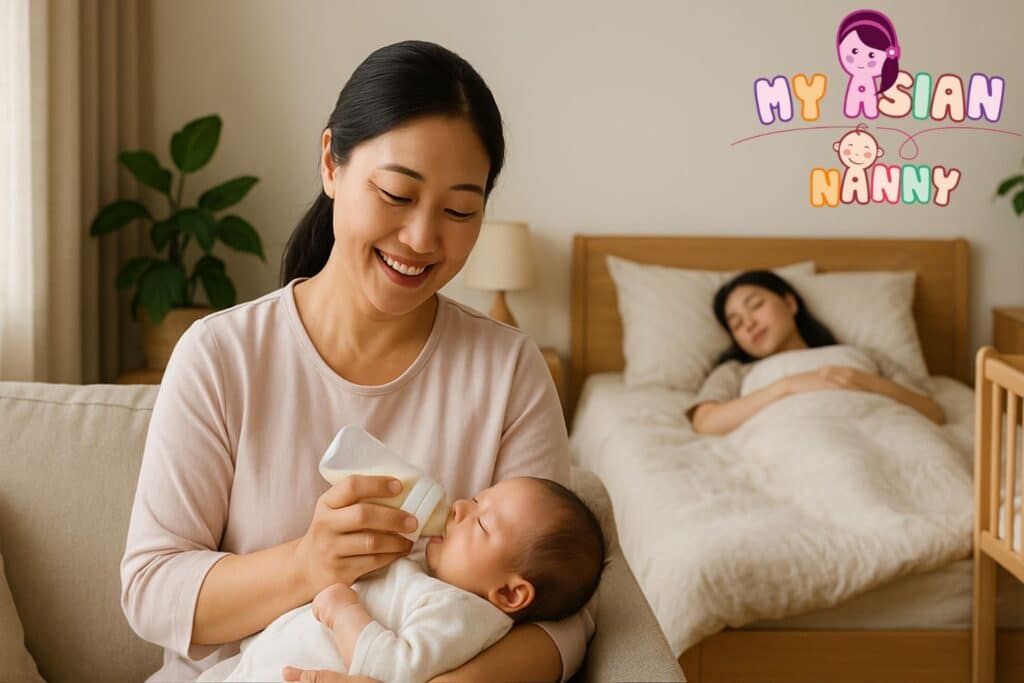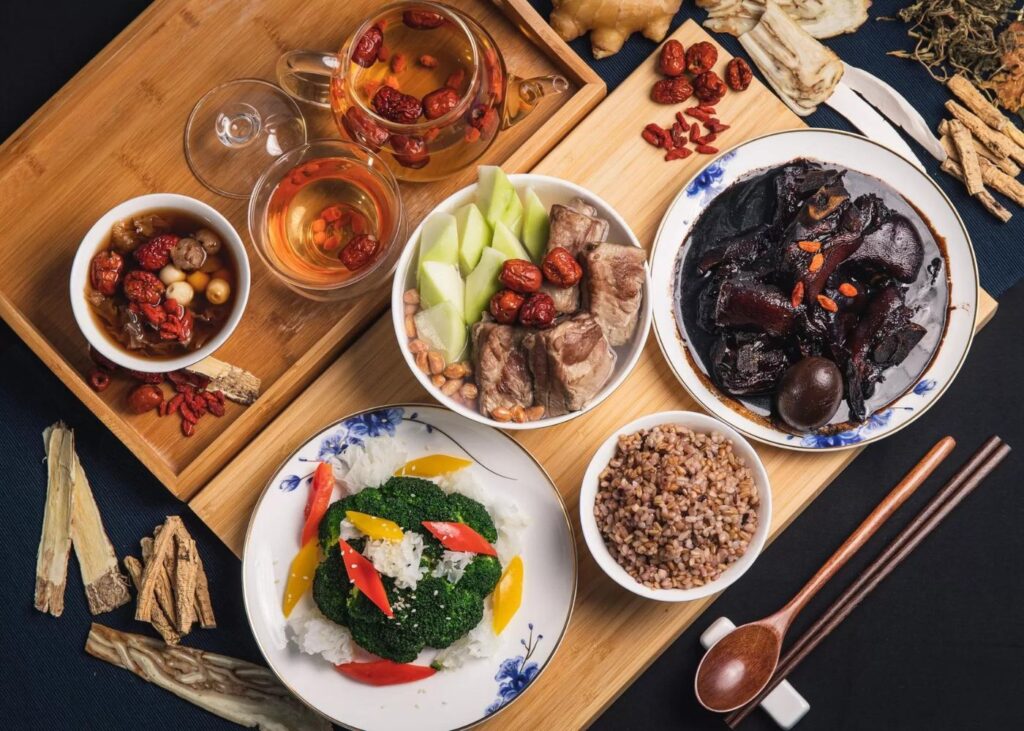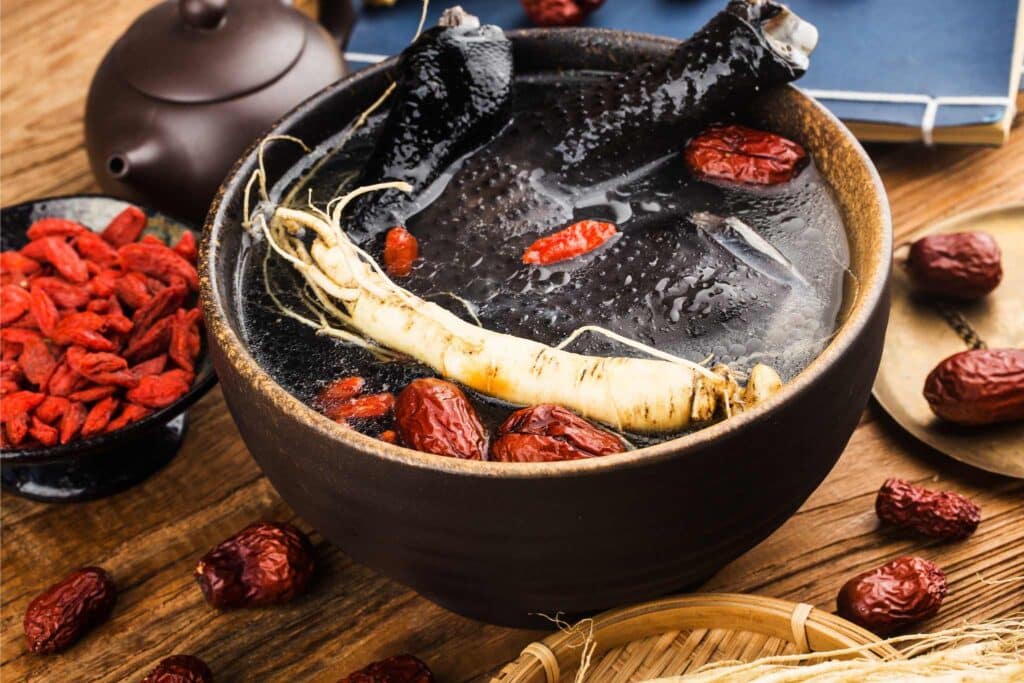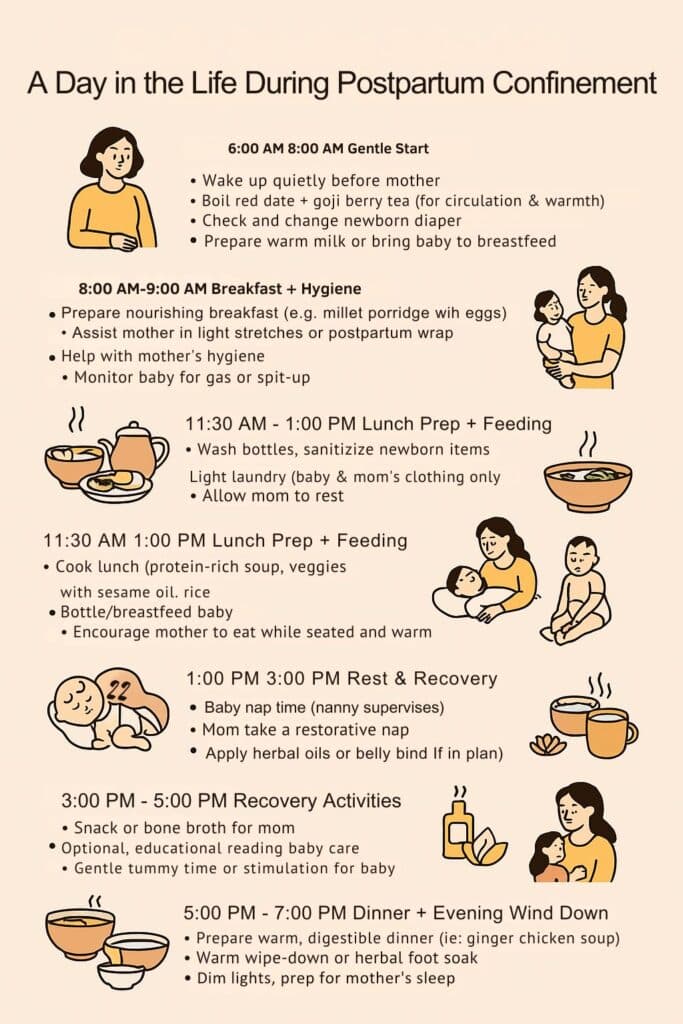What Is Chinese Confinement?

Chinese confinement, known as zuò yuè zi (坐月子) or “sitting the month,” is a well-established postpartum tradition with over 2,000 years of history. This comprehensive practice guides new mothers through the critical 30-100 days after childbirth, emphasizing rest, specialized nutrition, warmth, and dedicated care. The Chinese confinement period refers to this traditional practice, typically lasting from one to three months, and is designed to support both the mother’s recovery and the baby’s early development. Deeply rooted in Traditional Chinese Medicine (TCM) principles, confinement helps mothers recover holistically—addressing physical healing, emotional well-being, and the transition to motherhood.
Whether you’re expecting your first child, supporting someone who is, or simply interested in traditional postpartum care approaches from around the world, this in-depth guide explores every aspect of Chinese confinement. Chinese society has played a significant role in shaping and preserving these postpartum practices, ensuring their continued relevance and adaptation in modern times. From its ancient origins to modern adaptations, we’ve consulted with TCM practitioners, experienced postpartum doulas, and mothers who have practiced confinement to bring you authentic, practical information.
As Western interest in holistic postpartum recovery grows, many parents are discovering the wisdom in this time-honored tradition that prioritizes maternal recovery and newborn bonding in those crucial first weeks. During the Chinese confinement period, special attention is given to the baby’s needs, with practices focused on protecting the baby’s health and supporting the baby’s well-being alongside the mother’s recovery.
What You’ll Learn in This Guide
- What Is Chinese Confinement? Origins and Philosophy
- Key Benefits of Following Confinement Practices
- The Confinement Diet: Healing Foods and Nutrition Principles
- Essential Confinement Soups and Herbal Remedies
- Daily Routine During Chinese Confinement
- Traditional Do’s and Don’ts: Understanding the Rules
- Finding and Working with a Chinese Confinement Nanny
- Optimal Duration: How Long Should Confinement Last?
- Modern Adaptations of Chinese Confinement
- Regional Variations and Cultural Differences
- Preparing for Confinement: A Checklist
- Embracing Tradition in Modern Times
- Frequently Asked Questions About Chinese Confinement
What Is Chinese Confinement? Origins and Philosophy
Chinese confinement is a comprehensive postpartum recovery system that dates back to the Han Dynasty (206 BCE-220 CE). As a traditional practice, it holds historical significance in Chinese culture for supporting mothers after childbirth. The practice developed from observations that women who rested completely after childbirth seemed to experience fewer long-term health complications than those who resumed activities too quickly. The term zuò yuè zi (坐月子) literally translates to “sitting the month,” reflecting the emphasis on rest and minimal movement during this critical recovery window.
According to Traditional Chinese Medicine (TCM), childbirth creates a significant imbalance in the body’s energy systems. Labor and delivery cause what practitioners call a “great opening” of the body, depleting blood and vital energy (qi) while leaving new mothers vulnerable to harmful elements like cold air and wind. The confinement period is designed to protect mothers after they have given birth, close this energetic gateway, restore balance, and prevent chronic health issues that might otherwise manifest years later.
Over time, the development of this practice has been influenced by both medical theories and cultural transmission, with some customs passed down as wives tales and traditional beliefs.
Traditional confinement practices are specifically designed to support a woman’s recovery after giving birth, emphasizing rest, nutrition, and protection from environmental stressors.
Core Principles of Chinese Confinement
The philosophy of confinement centers around four key elements:
- Restoration of balance – Repairing the yin-yang equilibrium disturbed during childbirth
- Protection from environmental factors – Shielding the body from cold, wind, and dampness
- Blood and qi replenishment – Rebuilding vital energy through specific nutrients and rest
- Prevention of future ailments – Addressing postpartum healing thoroughly to avoid chronic health problems
Historically, confinement practices varied between royal courts, where elaborate rituals and specialized foods were prepared by palace physicians, and common households where grandmothers passed down folk wisdom through generations. Today, confinement remains deeply embedded in Chinese, Taiwanese, Hong Kong, Malaysian, and Singaporean cultures, with growing interest in Korean and Vietnamese communities as well.
During confinement, new mothers traditionally:
- Remain indoors – Staying in a controlled environment away from drafts, wind, and temperature fluctuations
- Consume warming foods – Eating specially prepared meals that drive out cold and replenish nutrients
- Avoid cold exposure – Keeping warm, including limiting contact with cold water or air conditioning
- Restrict physical activity – Minimizing household chores, strenuous movements, and even reading
- Accept specialized care – Receiving support from experienced family members or professional confinement nannies
What makes Chinese confinement unique among global postpartum traditions is its systematic approach and comprehensive nature. Rather than focusing solely on the baby, it acknowledges the profound physical transformation of childbirth and prioritizes the mother’s complete recovery as essential for her long-term health and well-being.
Today’s young parents often question the scientific basis for these traditions. While some practices have been validated by modern research—such as the benefits of rest for tissue repair and certain nutritional principles—others remain rooted more in cultural wisdom than empirical evidence. The most effective approach, as many practitioners now suggest, is finding a balance between traditional wisdom and contemporary understanding of postpartum health.
Key Benefits of Following Confinement Practices
When properly implemented, Chinese confinement offers numerous potential benefits for new mothers during the fourth trimester, a critical phase of physiological and emotional recovery. As a traditional practice, Chinese confinement has implications for public health, influencing maternal well-being and the risk of postpartum depression. Understanding these advantages can help families decide which aspects of the tradition they wish to incorporate into their own postpartum journey. A systematic review has examined the benefits of confinement, providing a structured synthesis of the available evidence.
Physical Recovery Benefits
- Accelerated healing of the reproductive system – The focused rest period allows the uterus to contract properly and return to its pre-pregnancy state
- Reduced risk of prolapse – Avoiding heavy lifting and strenuous activity helps strengthen pelvic floor muscles
- Better blood replenishment – Iron-rich foods and herbs help address postpartum blood loss
- Improved lactation – Specific foods and soups are designed to enhance milk production and quality
- Joint and bone recovery – High-collagen foods support musculoskeletal healing after the physical demands of pregnancy
Mental and Emotional Benefits
- Reduced postpartum anxiety – The structured routine provides security during a vulnerable time
- Prevention of “doing too much too soon” – Protection from the societal pressure to quickly resume normal activities
- Enhanced mother-baby bonding – Focused time for attachment without external distractions
- Community support – Traditional acknowledgment that new mothers deserve and require care
Research published in the Journal of Obstetrics and Gynaecology Research suggests that mothers who observe some form of confinement report lower rates of postpartum depression compared to those who don’t. While correlation doesn’t prove causation, the combination of nutritional support, rest, and practical assistance likely contributes to improved maternal well-being.
It’s worth noting that rigid adherence to all traditional rules isn’t necessary to gain benefits. Many modern practitioners recommend adapting confinement principles to individual circumstances while maintaining the core philosophy of rest, nutrition, warmth, and support.
The Confinement Diet: Healing Foods and Nutrition Principles

The confinement diet is perhaps the most distinctive and carefully preserved aspect of Chinese postpartum care. According to TCM practitioners, what a mother consumes during this period significantly impacts her recovery trajectory and future health. This isn’t simply about caloric intake—it’s a sophisticated nutritional system designed to heal, restore, and prevent specific postpartum conditions. The confinement diet is specifically crafted to support new mums and new parents during the crucial recovery period after childbirth.
The confinement diet follows several fundamental principles:
- Balance of “hot” and “cold” properties – Not temperature, but the energetic nature of foods
- Blood building and qi restoration – Prioritizing foods that replenish vital energy
- Promotion of lactation – Including galactagogues that enhance milk production
- Digestive support – Easily assimilated nutrients that don’t tax the recovering digestive system
- Anti-inflammatory effects – Herbs and foods that reduce postpartum inflammation
Essential Confinement Foods
The confinement diet typically includes:
- Ginger and sesame oil chicken – A warming dish believed to eliminate “wind” from the body while providing protein and essential fatty acids. Ginger is considered one of the most important healing ingredients during confinement.
- Black vinegar pig’s trotters – This calcium-rich dish combines collagen from the trotters with iron and minerals from eggs simmered in sweetened black vinegar. It’s particularly valued for strengthening bones and joints.
- Red date and longan tea – This sweet beverage contains jujubes (Chinese red dates) and longan fruit, both believed to increase blood flow and improve circulation while providing natural sweetness.
- Fish soups with papaya – Fresh fish provides lean protein while papaya is thought to promote milk production. This combination supports lactation and provides omega-3 fatty acids.
- Black chicken herbal soup – The silkie chicken (black-boned chicken) is prized for its high iron content and is often combined with herbs like dang gui (Chinese angelica root) to replenish blood.
- Liver and kidney dishes – Organ meats provide concentrated iron, B vitamins, and nutrients traditionally believed to strengthen the corresponding organs in the mother’s body.
- Whole grains and rice wine – Brown rice, millet, and small amounts of rice wine provide energy and are thought to improve circulation.
Foods to Avoid During Confinement
Just as important as what to eat is what not to eat during confinement:
- “Cold” foods – Including cucumbers, watermelon, mung beans, most raw vegetables, and citrus fruits
- Excessively spicy items – Hot peppers and strong spices may disrupt digestion and affect breast milk
- Cold beverages – Ice water, cold juices, and refrigerated drinks are strictly avoided
- Salty foods – Excessive salt is believed to cause water retention and impede healing
- Specific seafood varieties – Some traditions avoid shrimp, crab, and certain white fish
Modern Nutritional Perspective
From a contemporary nutritional standpoint, many confinement dietary practices align with sound postpartum nutrition recommendations. The emphasis on protein supports tissue repair, iron-rich foods address blood loss, and warm, easily digestible meals provide comfort and steady energy. However, the strict avoidance of fruits and vegetables can potentially lead to insufficient fiber and certain vitamins.
Progressive confinement nutritionists now recommend incorporating lightly cooked vegetables and room-temperature fruits to ensure balanced nutrition while respecting the traditional framework. The key is maintaining the warming principle while ensuring complete nutritional support.
Specialist confinement meal delivery services have become popular in cities with large Asian populations. These services combine traditional recipes with modern nutritional science, offering convenient solutions for families who want to observe dietary traditions without the burden of complex preparation.
Read more: Chinese Postpartum Meals – What to Eat and What to Avoid
Essential Confinement Soups and Herbal Remedies
In Chinese confinement tradition, healing soups occupy a central role in postpartum recovery. These aren’t ordinary broths but medicinal formulations carefully developed over centuries to address specific aspects of postpartum healing. Confinement soups combine protein sources, vegetables, and medicinal herbs into nourishing tonics designed to be easily digested and rapidly absorbed by the recovering body.
TCM practitioners view these soups as medicine first, food second. Each ingredient serves a therapeutic purpose, and combinations are chosen to balance the body’s energy, support organ function, and address specific postpartum needs like blood replenishment, milk production, and uterine healing.
Therapeutic Confinement Soups

- Sheng Hua Tang (生化汤) – A fundamental postpartum remedy containing angelica root (dang gui), Sichuan lovage root (chuan xiong), peach kernel (tao ren), and other herbs. This soup is typically consumed immediately after birth to promote blood circulation, reduce stagnation, and facilitate the discharge of lochia.
- Black Chicken and Dong Quai Soup – The silkie chicken provides high-quality protein and iron, while dong quai (angelica root) is renowned for blood tonification. Additional herbs like wolfberries, red dates, and astragalus root enhance immune function and energy.
- Papaya Fish Soup – Fresh fish (often carp or sea bass) is simmered with green papaya, which contains enzymes believed to stimulate milk production. Ginger and rice wine are added to warm the soup and prevent “cold” properties from the fish.
- Red Date and Longan Tea – This sweet, warming beverage combines red dates (jujubes), dried longan fruit, and goji berries to nourish blood, calm the mind, and provide gentle energy. It’s often consumed throughout the day between meals.
- Pork Knuckle and Vinegar Soup – Pork knuckles simmered with eggs in sweetened black vinegar create a calcium-rich remedy thought to strengthen bones and joints that may have weakened during pregnancy and delivery.
Herbal Formulations in Confinement
Beyond soups, confinement may include specialized herbal preparations:
- Herbal baths – Infusions of mugwort, ginger, and other warming herbs for sponge baths or foot soaks
- Herbal wine – Small amounts of rice wine infused with healing herbs to improve circulation
- Medicinal porridges – Rice congee cooked with therapeutic herbs for gentle morning nourishment
- Herbal compresses – Warm packs applied to the abdomen to support uterine contraction and healing
These remedies are traditionally prepared fresh daily, though in modern practice, some are available in pre-packaged form from specialized TCM pharmacies. Many families now use electric ceramic slow cookers to maintain the constant, gentle simmering required for optimal extraction of medicinal properties.
While scientific research on specific confinement soups remains limited, some individual herbs used in these recipes have been studied for their medicinal properties. For example, dong quai has demonstrated hematopoietic (blood-forming) effects in laboratory studies, while ginger’s anti-inflammatory properties are well-documented.
As with other aspects of confinement, these therapeutic soups are most effective when tailored to the individual mother’s constitution and specific recovery needs. Consultation with a qualified TCM practitioner is recommended, especially for women with pre-existing health conditions or those taking medications.
Daily Routine During Chinese Confinement
The rhythm of daily life during confinement follows a deliberately slow, nurturing pattern that prioritizes recovery and bonding. Unlike the often chaotic early days of parenthood in Western contexts, Chinese confinement establishes a structured routine that removes decision fatigue and creates a cocoon of predictability for the new mother.

Morning Routine (6:00 AM – 11:00 AM)
The day typically begins with the mother receiving her first warm beverage, often red date tea or a mild herbal tonic, brought to her bedside. This is followed by:
- Morning feeding – Breastfeeding or pumping with support from the caregiver
- Light cleansing – A warm washcloth bath with ginger water or herbal infusions
- Nutritious breakfast – Typically a warm rice porridge (congee) with protein, such as shredded chicken, liver, or egg
- First herbal soup – A medicinal broth designed for morning energy and blood replenishment
- Gentle movement – Very limited stretching or walking within the room (more common after the first week)
Afternoon Routine (11:00 AM – 5:00 PM)
Midday focuses on nourishment and rest:
- Substantial lunch – Often the largest meal of the day, featuring warming proteins, cooked vegetables, and rice
- Rest period – An extended nap while the caregiver handles baby care
- Afternoon feeding session – Breastfeeding or pumping with attention to proper positioning
- Light snack – Nuts, dried fruits, or a small serving of confinement-appropriate food
- Very limited visitor time – If allowed at all, typically restricted to the immediate family
Evening Routine (5:00 PM – 10:00 PM)
The evening transition emphasizes winding down:
- Early dinner – A warming meal, often soup-based with additional protein
- Evening herbal tonic – Specialized formulations for overnight healing
- Gentle hygiene – Warm washcloth cleansing, herbal sitz bath, or partial bath
- Baby bonding time – Skin-to-skin contact and feeding before bedtime
- Early bedtime – Prioritizing maximum sleep during the baby’s first long stretch
Overnight Support

Traditional confinement support includes overnight care so the mother can maximize her rest. The caregiver typically:
- Handles diaper changes and brings the baby to mother only for feeding
- Provides midnight snacks to support energy for night feedings
- Maintains the room at an appropriate temperature
- Ensures the mother remains covered and protected from drafts
Throughout all daily activities, several principles remain constant:
- Warmth maintenance – The mother stays well-covered with socks, a hat if needed, and appropriate clothing
- Minimal exertion – Physical effort is strictly limited, with assistance for getting in and out of bed
- Hydration – Warm water, herbal teas, and soups are provided regularly
- Limited screen time – Traditional confinement restricts reading and screen use to prevent eye strain
- Emotional calm – The environment remains quiet, peaceful, and free from stressful discussions
This highly structured approach may seem restrictive by Western standards, but many mothers who have experienced proper confinement report feeling deeply nurtured and protected during a vulnerable life transition. The routine creates a buffer against the overwhelming responsibilities of new parenthood, allowing focused healing and gradual adjustment to motherhood.
Traditional Do’s and Don’ts: Understanding the Rules
Chinese confinement comes with a comprehensive set of guidelines that have been passed down through generations. While some rules may seem unusual or even extreme to those unfamiliar with the tradition, each has a purpose rooted in traditional understanding of postpartum physiology. Modern practitioners often adapt these rules based on current healthcare knowledge and individual circumstances.
Traditional Do’s

- Do stay warm at all times – Keep the body, especially the head, feet, and abdomen, well-covered
- Do consume warm foods and beverages – Everything ingested should be at least room temperature, preferably warm
- Do wear socks and slippers – Keep feet protected from cold floors
- Do bind the abdomen – Many traditions use special postpartum wraps to support abdominal organs
- Do rest extensively – Conserve energy for healing and milk production
- Do accept help – Allow others to handle household tasks and support baby care
- Do eat frequently – Small, nutritious meals every few hours support recovery and lactation
- Do practice proper posture – Sit and lie in positions that support uterine healing
Traditional Don’ts
- Don’t shower or wash hair – Traditionally avoided for at least 7-10 days (modern alternative: quick warm showers with immediate drying and warming)
- Don’t expose yourself to drafts or wind – Keep windows closed and avoid fans or air conditioning
- Don’t drink cold water – Room temperature or warm beverages only
- Don’t read books or use digital devices extensively – Believed to strain the eyes and affect liver energy
- Don’t cry – Emotional upset is thought to damage vital energy and cause future eye problems
- Don’t have sexual intercourse – Abstinence is recommended for the full confinement period
- Don’t lift heavy objects – To prevent uterine prolapse and support pelvic floor healing
- Don’t go outdoors – Traditionally, mothers stay indoors for the entire month
The Logic Behind the Rules
Understanding the reasoning behind confinement rules helps families make informed decisions about which to follow:
- Warmth preservation – TCM views the postpartum body as vulnerable to cold invasion, which is believed to cause joint pain and health issues later in life
- Rest enforcement – Many rules essentially function to ensure complete rest during critical healing
- Infection prevention – Some practices (like limiting visitors) align with a modern understanding of reducing infection risk
- Focus on recovery – Restrictions on reading and technology create space for physical and emotional healing
Modern Adaptations
Contemporary practitioners often modify traditional rules in the following ways:
- Hygiene practices – Warm showers with immediate drying rather than avoiding bathing
- Gentle movement – Light walking and basic postpartum exercises for circulation
- Balanced diet – Including some lightly cooked vegetables for fiber and vitamins
- Mental stimulation – Allowing limited reading and screen time for emotional well-being
- Fresh air – Brief exposure to indirect outdoor air in appropriate weather
The most beneficial approach combines respect for traditional wisdom with flexibility based on individual health circumstances. Working with knowledgeable practitioners who understand both traditional practices and modern maternal health can help families navigate which rules to adopt strictly and which to modify.
Finding and Working with a Chinese Confinement Nanny

A key component of traditional confinement is the support of a specialized caregiver known as a yue sao (月嫂) or confinement nanny. These professionals combine practical skills in newborn care with deep knowledge of postpartum traditions, herbal cooking, and maternal support. For many families, hiring a confinement nanny represents a significant investment in the mother’s recovery and the baby’s early development.
What a Confinement Nanny Does
The comprehensive role of a yue sao typically includes:
- Specialized cooking – Preparing all confinement meals, tonics, and herbal soups according to TCM principles
- Newborn care – Handling feeding support, bathing, changing, and monitoring the baby’s health
- Maternal care – Assisting with comfort measures, breast care, and postpartum recovery
- Laundry management – Washing and sanitizing baby items and the mother’s clothing
- Traditional remedies – Administering herb baths, abdominal wrapping, and other cultural practices
- Knowledge transfer – Teaching parents essential baby care skills and postpartum recovery techniques
- Emotional support – Providing experienced guidance through early parenting challenges
Finding a Qualified Confinement Nanny
Finding the right yue sao requires advance planning and careful consideration:
- Start early – Begin searching by the second trimester, as the best nannies are often booked months in advance
- Use reliable sources – Seek recommendations from friends, family, or reputable postpartum agencies such as My Asian Nanny
- Verify credentials – Check for certification, training, and health screenings
- Conduct interviews – Discuss experience, approach to newborn care, and cooking abilities
- Clarify expectations – Be explicit about dietary preferences, parenting philosophy, and house rules
- Check references – Speak with previous clients about their experiences
Typical Arrangements and Costs
Confinement nanny services vary in structure and pricing:
- Live-in service – The most traditional arrangement, with the nanny residing in the home for 24/7 support
- Complete Coverages – 24/7 around the clock care for Baby and Mother
- Optional Meal Service – Get the added benefit of a yue sao and traditional postpartum meals made for the Mom
- Duration options – The standard length is 30 days, but many families choose 40 or even 100 days depending on recovery needs and cultural preferences. Medical complications, C-section births, or nursing challenges may require a longer period of support.
Modern Adaptations of Chinese Confinement
Zuo yuezi, or “sitting the month,” is a traditional Chinese postpartum recovery practice spanning approximately 30-40 days after childbirth. This ancient tradition, dating back thousands of years, has evolved to meet contemporary needs while preserving its core principles of rest, restoration, and maternal care.
In today’s fast-paced world, modern Chinese women both at home and abroad are finding innovative ways to honor this cultural tradition while adapting it to fit their lifestyles and beliefs. Many now incorporate evidence-based medical practices alongside traditional wisdom, creating a hybrid approach that honors heritage while embracing contemporary healthcare advances. Unlike in high income countries, where postpartum care guidelines often emphasize early mobilization, patient-centered care, and discourage strict confinement, Chinese practices maintain a focus on rest and specific dietary regimens. These differences highlight how postpartum care varies not only between China and high income countries, but also among other cultures with their own unique traditions.
Professional confinement services have emerged as a booming industry, offering everything from in-home confinement nannies (yue sao) to luxurious confinement centers providing hotel-like accommodations with specialized care. Apps and online platforms connect new mothers with certified confinement specialists, meal delivery services, and virtual support communities. Postpartum practices can differ significantly in different countries, with regions such as Latin America, East Asia, and Africa each having their own customs and guidelines for maternal care.
Regional Variations and Cultural Differences
While sharing core principles, confinement practices vary significantly across East and Southeast Asia:
Mainland China: Typically follows stricter traditional rules, with emphasis on avoiding cold elements and consuming warming foods like ginger, rice wine, and bone broths. Northern regions often maintain longer confinement periods compared to southern areas.
Taiwan: Places strong emphasis on specialized postpartum meal programs with scientifically balanced nutrition alongside traditional ingredients. Modern confinement centers are particularly popular here.
Hong Kong and Singapore: Often feature a blend of Chinese and Western practices. Professional confinement nannies are common, and practices tend to be more flexible regarding restrictions.
Malaysian Chinese Communities: Incorporate local herbs and ingredients like turmeric and lemongrass into traditional Chinese confinement recipes, creating unique fusion approaches.
Western Diaspora: Chinese families living in Western countries often adapt practices significantly, focusing on key elements like specialized nutrition and avoiding cold while discarding some of the stricter physical restrictions.
Preparing for Confinement: A Checklist
Six Months Before Delivery:
- Research and interview confinement nannies or centers if desired
- Stock up on confinement herbs, red dates, and specialized ingredients
- Prepare freezer meals according to confinement principles
One Month Before:
- Arrange household support (family members or hired help)
- Purchase appropriate loose, comfortable clothing
- Set up a comfortable recovery space at home
Week of Delivery:
- Finalize meal plans with family members or meal delivery services
- Prepare warm beverages (red date tea, ginger water) in thermoses
- Establish a communication system for support during recovery
Embracing Tradition in Modern Times
Chinese confinement is one of the most time-honored postpartum traditions in the world. Whether passed down by grandmothers or delivered through modern care services, it reflects a deep understanding of what new mothers need: nourishment, rest, warmth, and care.
By embracing this tradition—fully or partially—you are taking steps toward a holistic and respectful recovery. The body has undergone a miraculous transformation. It deserves kindness. The mind, too, needs space to adjust, reflect, and strengthen. Confinement offers a container in which all of that is possible.
If you are planning for confinement, consider outlining your preferences in a postpartum care plan. Communicate clearly with your partner or caregiver. Choose a Yue Sao, doula, or support team that understands your goals. And most importantly, listen to your body—let tradition serve your healing, not hinder it.
Emotional Support During Confinement

Emotional support is a cornerstone of traditional Chinese confinement practices, playing a vital role in the well-being of new mothers during the postpartum period. In addition to physical recovery, the confinement period is a time when new mothers are especially vulnerable to emotional ups and downs, including postpartum depression and anxiety. Chinese confinement practices recognize this need by fostering a nurturing environment where family members, a confinement nanny, or a postpartum doula provide not only practical help but also emotional care.
A confinement nanny or postpartum doula is often trained to offer reassurance, listen to concerns, and help new mothers adjust to the demands of caring for a newborn baby. In many families, the mother-in-law or other close relatives take on the responsibility of supporting the new mother, ensuring she feels valued and cared for. This emotional support can make a significant difference, helping new mothers feel less isolated and more confident as they navigate the challenges of early motherhood.
Every new mother’s needs are unique, and some may require more emotional support than others. Open communication with family members and caregivers is essential to ensure that the new mother’s emotional needs are met. By prioritizing emotional well-being alongside physical recovery, traditional Chinese confinement helps new mothers build a strong foundation for both themselves and their babies during this transformative time.
Common Challenges and How to Overcome Them
While traditional Chinese confinement practices offer many benefits, new mothers may encounter several challenges during the confinement period. One of the most common difficulties is adhering to strict dietary guidelines, which can sometimes feel overwhelming or restrictive. To make this aspect of postpartum confinement more manageable, new mothers can consult with lactation consultants or healthcare providers who understand Chinese postpartum confinement, ensuring that nutritional needs are met without unnecessary stress.
Another challenge is the limited physical activity often prescribed during the confinement period. While rest is important, a complete lack of movement can lead to muscle weakness and reduced blood circulation. Incorporating gentle physical activity, such as light stretching, yoga, or tai chi, can help maintain health and support recovery, as long as these exercises are tailored to the mother’s condition and approved by a healthcare professional.
Feelings of isolation and loneliness are also common, especially when new mothers spend extended periods indoors. Staying connected with family members, friends, or other new mothers through phone calls, video chats, or online support groups can help combat these feelings and provide much-needed encouragement. By acknowledging these challenges and seeking support, new mothers can make the most of their confinement period, focusing on both their physical and emotional well-being.
Support for New Moms
Support is essential for new mothers during the confinement period, and traditional practices in Chinese and other Asian cultures place a strong emphasis on community and family involvement. In addition to emotional care, practical assistance with household chores, childcare, and meal preparation allows new mothers to rest and recover fully. A confinement nanny or postpartum doula can be invaluable, taking on daily responsibilities so the new mother can focus on her own health and her newborn baby.
Family members, especially the mother-in-law, often play a central role in providing guidance and support, drawing on traditional practices to ensure the well-being of both mother and baby. In modern times, online resources such as blogs, forums, and social media groups offer new mothers opportunities to connect with others who are experiencing similar challenges, creating a sense of community even when physical support may be limited.
By recognizing the importance of both practical and emotional support, families can help new mothers navigate the postpartum period with greater confidence and resilience. Whether through traditional practices or modern resources, ensuring that new mothers feel supported is key to their health, well-being, and successful transition into motherhood.
